The Work of Quentin Tarantino: Quality Over Quantity
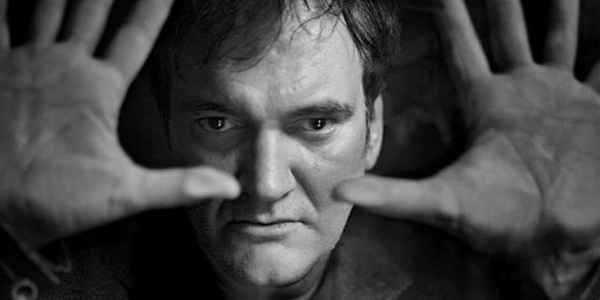
There is no simple answer when one asks what makes a great director. It can be an array of different factors, from having well-written script, to having a new and distinctive way of shooting scenes. What separates a good director from an iconic director is how their films inspire new generations of filmmakers. The well-known Quentin Tarantino is one of those iconic directors. He is one of the most famous modern directors – his name alone can sell a movie. Tarantino has a lot of distinctive styles that reoccur in all of his films. The three big ones are his witty dialogue, his massive amount of blood and violence, and paying tribute to the older films he grew up with.
Even though his styles are distinctive, Quentin Tarantino has been considered a controversial director because of all the intense bloodshed in his films. While it is true that Tarantino’s use of blood is hardly subtle, his films should not be considered instructional videos on how to hurt people in real life. His films are exactly that, just films, and this is clear by how intently preposterous his violence is portrayed in his films. When Marvin’s face explodes like a watermelon in Pulp Fiction, the audience should know the scene is unreal because peoples’ faces do not explode when shot by a small handgun. The other reason Tarantino spatters blood around is because the films he pays tribute to also are know for excessive amounts of violence, like samurai films and spaghetti westerns.
Speaking of Tarantino paying tribute to other films, he has been accused of being unoriginal because of how many elements he takes from other films. This is not really a valid argument because other famous directors like George Lucas and Martian Scorsese also take a lot of elements from other films. Besides, as the old saying goes “imitation is the sincerest from of flattery”. Since he only has a total of 7 feature films he has directed, it would make sense to analyze all of familiar staples in his films. Four Rooms will be excluded because only his full-length films will be discussed.
Reservoir Dogs (1992)
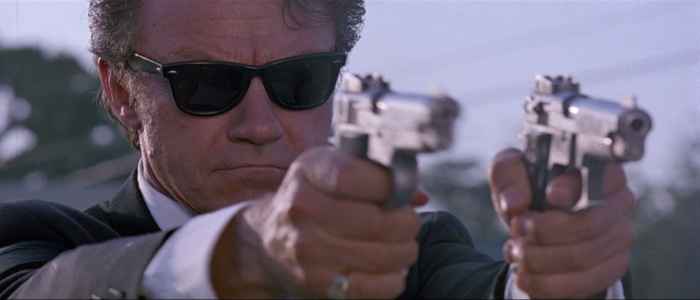
Reservoir Dogs was the small independent film that made a name for Quentin Tarantino as a director. The film is about eight criminals who get together to rob a diamond store, only to have the heist fail miserably in the end. The main characters are the surprisingly considerate Mr. White (Harvey Keital), the psychopathic Mr. Blonde (Michael Madsen), the self-centered Mr. Pink (Steve Buscemi), and Mr. Orange (Tim Roth), who spends most of the movie bleeding to death. Because the film was independent, it had an extremely low budget, to the point that all the actors had to supply their own wardrobes. Even the heist itself is never shown on screen, and the audience only gets to see the aftermath of the heist.
Instead of this being seen as a drawback, it instead gave Tarantino the chance to display how all a film really needs is well-realized characters. A film does not necessarily need explosions or special effects to make a good movie because if the characters are boring, nobody is going to care about the film. While Reservoir Dogs has its fair share of bloodshed, the scenes that really resonate with viewers are when the characters are arguing with each other. Of course, a character is only as good as the dialogue they spout out, and Tarantino has created a type of dialogue that is all his own. His characters will chat to one another in a casual manner, and the conversation may come off as just filler. To any director, it seems like recreating Taranto’s dialogue is simple, but what is often overlooked is how his dialogue scenes establish foreshadowing.
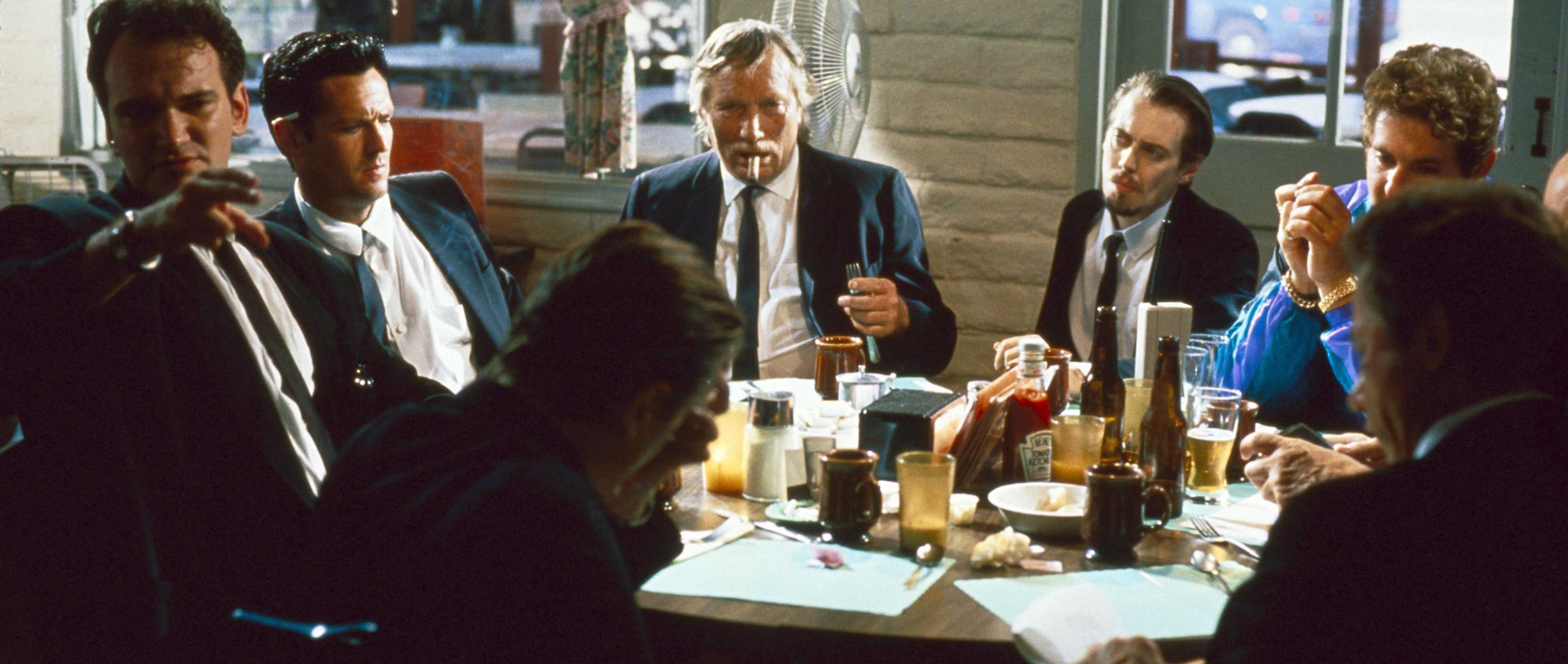
Take the opening scene in the diner for example. When Mr. Pink is the only one at the table that does not put in money for a tip, it shows him as cheap and self-centered. By the end of the movie, the remaining characters basically kill one another, except for Mr. Pink, who runs away at the end, presumably with all the diamonds. Another example of foreshadowing is in the diner scene when Joe Capet asks who did not pay the tip, and Mr. Orange rats out Mr. Pink. This foreshadows how Mr. Orange is secretly an undercover cop, working among the group. While the films is simple when regarding the story, it is small attentions to details that makes Reservoir Dogs more than just another crime thriller.
Pulp Fiction (1994)
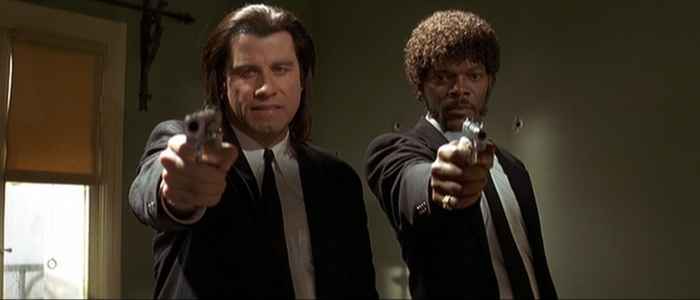
Inspired from pulp magazines from the 50s, Pulp Fiction is arguably Tarantino’s most popular film, probably because it expanded upon what made Reservoir Dogs so good. The film is about three intertwining stories that are told out of order. The first story is about the hit-man, Vincent Vega (John Travolta), simply taking his boss’s wife named Mia Wallace (Uma Thurman) out for dinner. The second story is about the boxer Butch Collidge (Bruce Willis) trying his best to avoid the crime boss Marsellus Wallace (Ving Rhames), after he went behind his back. The last story is about Vincent Vega and other hit-man, Jules Winnfield (Samuel L. Jackson) having one of the luckiest, yet unluckiest mornings of their lives.
The plot does not necessarily have a main character, but simply has an ensemble cast that gets the same amount of screen time, more or less. The closest we get to main characters are Vincent Vega because he shows up in all three stories and Jules, who has the most complete arc in the film. They also represent two conflicting sides of divine intervention, which becomes an important theme of Pulp Fiction. After they miraculously survive a shower of bullets from a scared gunman, Jules believes it is a sign of God intervening, but Vega sees it as just dumb luck.
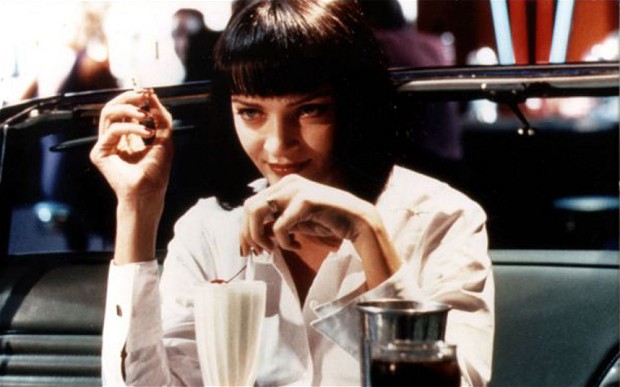
Divine intervention is a continuing theme throughout the film because it tests the audience on believing if there is an all powerful force, watching and predicting our every move. When analyzing Butch’s story, it can be argued that having his flightier girlfriend forgetting his father’s watch, him getting it back, running into Vega and Marsellus Wallace, and stumbling upon a deranged sex dungeon is all bad luck. However, if looking at the unusual situation as divine intervention, it makes sense because of how it benefits Butch in the end. Because Butch saves Wallace from two men sexually assaulting him, Wallace agrees to let Butch get out scot free, as long as he never shows his face back in town. If Butch never saved Wallace, he would still be on the run from Wallace’s men, and he would always be looking behind his back.
Tarantino’s distinct dialogue makes a comeback, and it carries the same foreshadowing as it did in Reservoir Dogs. For example: Vega and Jules have a long casual conversation, debating if Marsellus Wallace killed a guy for massaging Mia Wallace’s feet. It may seem like entertaining filler at first, but when Vega is forced to take Mia to dinner, he is put in a scary situation. He has to makes sure that she has a good time, but he is scared to make any romantic implications to her, worried about what Marsellus Wallace could do to him. With a fantastically written script and spot-on casting, Pulp Fiction is an entertaining and re-watchable classic.
Jackie Brown (1997)
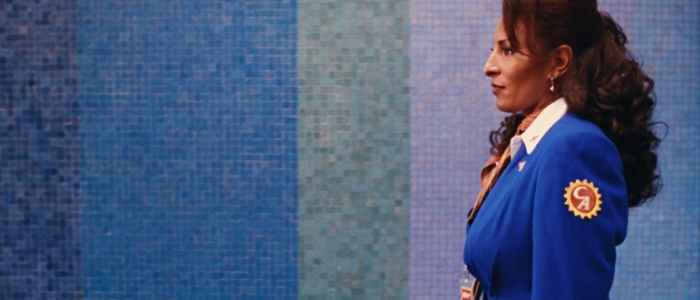
Based on the book by Elmore Leonard titled Rum Punch, Jackie Brown is the rare occurrence of Tarantino adapting a book to film. The film is about the female flight attendant, Jackie Brown (Pam Grier), who has been smuggling money from Mexico into the America. After getting caught with planted drugs and going to jail, she is bailed out by an old bondsmen named Max Cherry (Robert Forster). She is soon recruited by two cops, to help catch a gun dealer named Ordell Robbie (Samuel L. Jackson), by pretending to help him smuggle money. She in now working for both sides, as she tells Ordell that she is only working with the cops to throw them off. In reality, she is playing both Ordell and the cops for suckers, and she is really tying to take the smuggled money for herself.
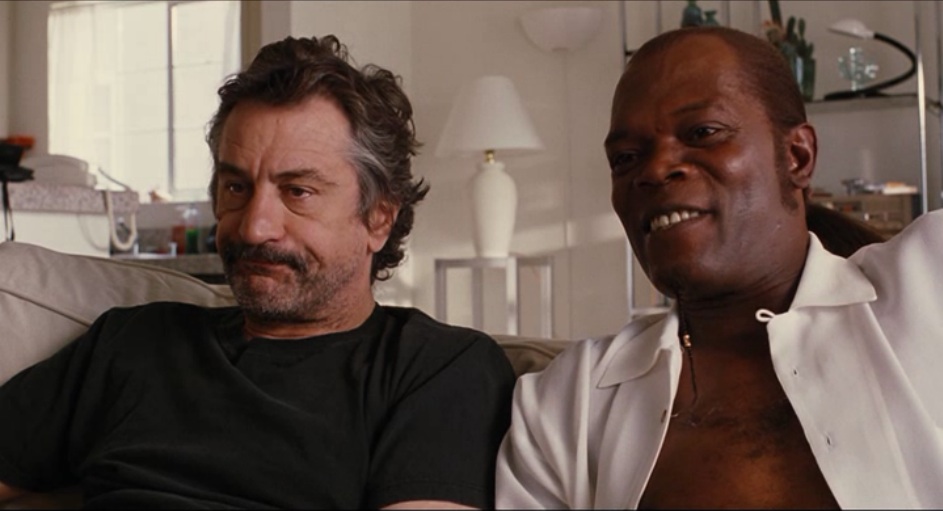
Jackie Brown may have been considered underwhelming when compared to Pulp Fiction, but it is still a great crime thriller never-the-less. What may have stopped it from being an instant classic is how it does not contain a lot of Tarantino’s staples.There is almost no blood, the dialogue is used more for exposition, and the story is told linearly, with no flash backs or scenes told out of order. This may be because the film was based on a book, and Tarantino was trying his best to stay true to the source-material .The film borrowed a lot of elements from old blaxplotation movies from the 70’s. Blaxplotation films were crime thrillers that primarily had black actors, and were accompanied by soul and disco music.
While Jackie Brown does have a black lead character and funky soundtrack, unlike blaxplotation, the film does not treat its characters like stereotypes, and instead uses a mixture of white and black actors respectively. Jackie Brown herself does not feel like a stereotypical black character, and neither does Ordell Robbie because their race never came off as their defining characteristics. Much like Reservoir Dogs, when you strip a movie down to its bare bones, all it needs is relatable and interesting characters, and Jackie Brown delivers in that regard.
Kill Bill: Volumes 1 & 2 (2003-04)
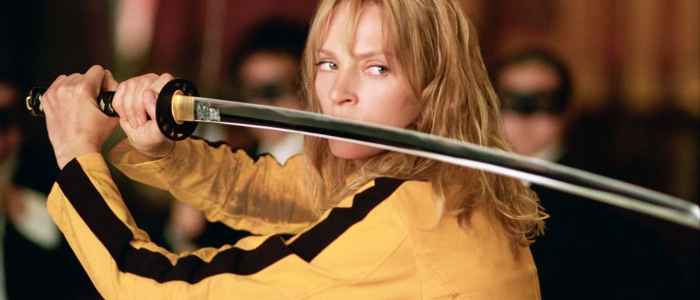
Kill Bill is the heavily martial art inspired revenge film about an ex-assassin getting presumably killed on her wedding day by her fellow assassin comrades. After she comes out of a coma and realizes her unborn baby is missing, she vows to kill all four of the assassins that ruined her wedding day, and then finally encounter the man named Bill (David Carradine). The unnamed main character known as The Bride (Uma Thurman) is not a typical protagonist usually seen in martial art movies, considering she is an American woman with bright blonde hair.
This is actually a smart choice on Tarantino’s part because Hollywood seriously needs more female action characters in leading roles. After watching Kill Bill, one cannot help but think that the excuse that a female lead character would not work in an action movie seems invalid.In fact most of the best characters in the film are women, whether it be the katana wielding O-Ren Ishii (Lucy Liu), the tough as nails Vernita Green (Vivica A. Fox) or the hot tempered Elle Driver (Daryl Hannah). The film is very female empowering, but the film never rubs this in the audience’s face, to the point that it could become gimmicky. Kill Bill is also the first Tarantino movie to be more action oriented, and it shows with the fantastic action scenes and stunt choreography.
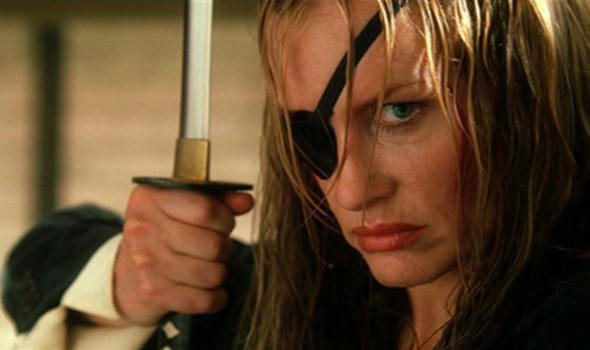
There are plenty of examples of Tarantino mimicking styles from old kung fu and samurai films. The constant use of quick close up shots, the ridiculous array of Japanese weapons, and guys bleeding geysers of blood are just a few of these styles seen in Kill Bill. The two films have more to offer that just relentless action scenes, because you cannot have a Quentin Tarantino film without having witty dialogue. Instead of the dialogue feeling like it is simply delaying for the next action scene, it actually gets the audience interested because of how it establishes character development and suspense. When simply watching the first scene in Kill Bill: Volume 1 in which the Bride confronts Vernita Green at her home, not only does their chat establish who these characters are, but also builds suspense on who is going to throw the next punch, or knife in this case.
While the audience knows this is a revenge movie and it would be strange to kill the main character in the first ten minutes, the suspense is raised when Vernita’s daughter is thrown into the scenario. Lastly, what made the Bride such a well-realized character is how she constantly battles between the life of a deadly killer and that of a normal woman. As Bill uses the proper Superman comparison by the end of the film, she can try to have a normal life all she wants, but she will always be a katana wielding killer. As we speak, the possibilities of Tarantino making a Kill Bill: Volume 3 is up in the air, and if not, at least we have two films that will be remembered as the director’s best.
Death Proof (2007)
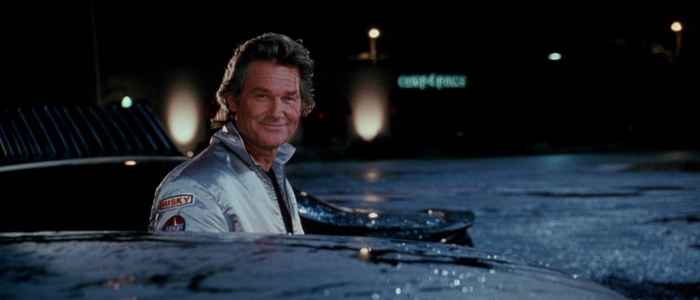
Death Proof was released alongside Robert Rodriguez’s Planet Terror in a double feature called Grindhouse. The double feature was named after grindhouse theaters, which specifically showed very low budgeted films that were filled with exploitative violence and sex appeal. Since Planet Terror was as eccentric zombie movie, Quentin Tarantino decided to make a slasher movie with Death Proof. The film is about a car stuntman named Stuntman Mike (Kurt Russell), who appears as a smooth ladies man, but who actually kills his female victims with his intimidating stunt car.

There are two different groups of women who come across Mike, and both come at him in two completely different ways. One group of women fall for his charming looks when they run into him in a bar, while the other group clashes with Mike on the road, and they stoop to his bloodthirsty level when he tries to kill them. Essentially, the first group of women represent victims of abusive men, while the second group represents women being able to step up to abusive men, and to put them in their place. It is hardly a subtle message, but no one expected any subtlety when walking into the film. The look of Death Proof perfectly encapsulates the look of old grindhouse films by having reel scratches and cigarette burn being the established stylistic choice.
Despite having a great look, a flaw of Death Proof is that the characters are not as well-written as in his other films, mostly because they are not very likable. The characters in his films like Reservoir Dogs and Pulp Fiction may be criminals, but they are still relatable, and they oddly show some sort of humanity once and awhile. The women in Death Proof just come of as a little bit to self-centered, therefore when a long stretch of dialogue appears in the films, the audience is not as engaged because the characters are unlikable. Death Proof is not a bad film at all; in fact, it is a very unique film in the slasher genre. However, when compared to Tarantino’s other films, it comes off as his least best; even he admitted it is his least favorite film. Nevertheless, Death Proof is still a great throw back to a once forgotten time in cinema history.
Inglourious Basterds (2009)
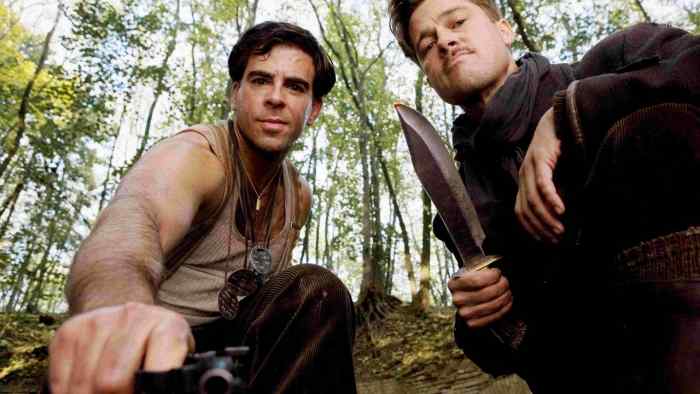
Inglourious Basterds is one of the smartest, yet also one of the most mindless action thrillers in resent memory. When a film takes place in World War II, it is usually based on a true story, but Tarantino had a different plans for Inglourious Basterds. The film follows a group of rebel Jewish soldiers lead by Lt. Aldo Raine (Brad Pitt), devoted to bringing down Hitler and the Nazi party. They work alongside the secretly Jewish theater owner Shosanna (Mélanie Laurent), as they hatch a suicidal plan to kill Hitler and his followers at a film screening in her theater.
The title of the film is lifted straight from the 1978 Italian action comedy The Inglorious Bastards, which also uses Nazis as the undisputed villains. Tarantino certainly took liberties when filming Inglourious Basterds by not only fictionalizing most of the characters, but also by rewriting history in order to benefit the story.Despite changing the history when regarding the nazis, Tarantino still implemented strong themes of loss and violence prevalent in that time period, showing that he took World War II history seriously. The film opening demonstrates this perfectly, as a man is secretly hiding Jews under his house, while the despicable Nazi Col. Hans Landa (Christoph Waltz) interrogates the home owner. Not only is the scene tense, but it also accurately conveys what a terrifying time in history it was for Jewish people.
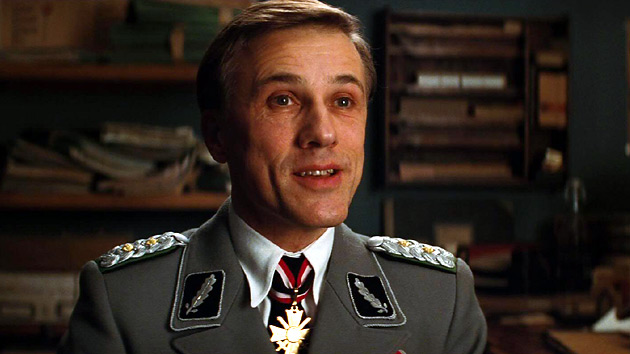
It is scary to think how easily men could be persuaded into ratting out Jews, and also how relentless the Nazis were when hunting and killing Jews. Moments like that are treated respectfully, yet the film does not take itself too seriously, and Tarantino knows when to have fun with a premiss like this. To make a war centered film set World War II, Nazis are the easiest villains to use because of the pre-established notion of the group being bad guys in the public eye. Nazis are basically blood-filled piñatas for our heroes to stab, bash or blow up, knowing that is what the audience wants. However, the scene where Hitler and other Nazi sympathizers are watching a propaganda film is symbolically holding up a mirror to the audience.
They are cheering for Nazis killing other people the same way we, the audience, are cheering for Nazis getting what they deserve. This is not to humanize the Nazi party, but instead to establish how in times of war, villanizing the enemy makes your side more heroic. The character that embodies this is Hans Landa, better known as the Jew Hunter. He does not execute Jews to boost his evil persona, he does it because he sees himself as the hero, and the Jews and Jewish sympathizers are a threat. He is certainly a vile villain, yet he is not as mustache-twirling as Nazi character are usually portrayed in cinema. Inglourious Basterds may not be the best film to take notes on for a history class, but it does attempt to show what violence-driven mindsets might have been like back in World War II.
Django Unchained (2012)
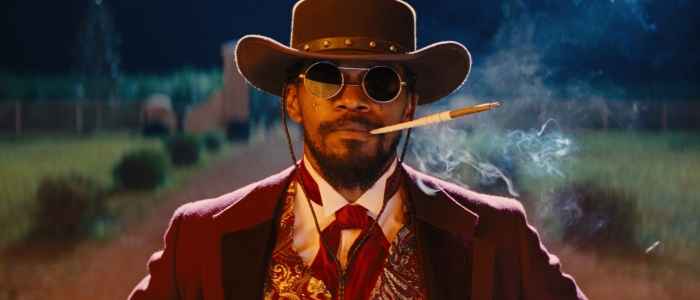
For Quentin Tarantino’s 7th film, he decided to once again direct a period piece with Django Unchained. The film takes place two years before the Civil War, and our main protagonist Django (Jamie Foxx) was a harshly beaten slave, until a fake dentist named King Schultz (Christoph Waltz) saves him from his captors. Schultz turns out to be a very handy bounty hunter, and decides to recruit Django to work for him, not as a slave, but as his protégé. After taking some bounties and befriending each other, Schultz agrees to help Django to rescue his beautiful wife Broomhilda (Kerry Washington) from the sophisticated, yet disgusting plantation owner Calvin Candie (Leonardo DiCaprio).
Django Unchained was not only inspired by westerns, but specifically spaghetti westerns, known for being more gritty and bloodier than older westerns. The name was even inspired by the 1966 spaghetti western Django, starring Franco Nero. The spaghetti westerns were escapism at its finest, but because of that they rarely ever delved into the disturbing subject of American black slavey. What Tarantino wanted was to make an inspiring black protagonist for the western genre, considering there are almost none. Tarantino also wanted to make a symbol of hope for black people during one of the dark times in American history. Django Unchained might be Tarantino’s most controversial film, and it wasn’t because of all the blood splatter, though there was plenty of that in the movie.
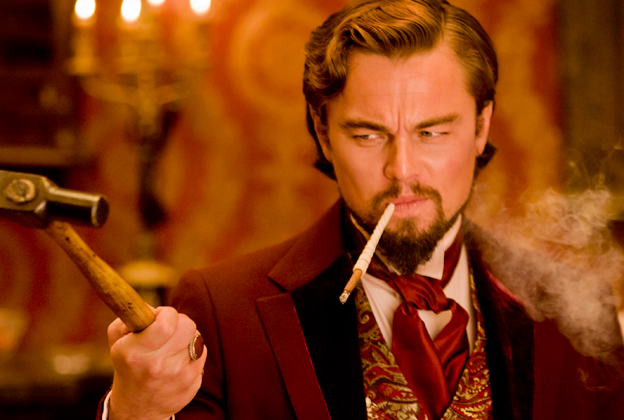
No, even though the film had a black protagonist and antislavery message, some people saw the film as ‘racist,’ or at least ‘offensive’ to slave history. This was mainly publicized by the director Spike Lee, saying how it was in bad taste to treat his ancestors legacy like a bloody western. That is an understandable ideology, yet at the same time, Tarantino did take the subject material seriously. It may be a spaghetti western at heart, but much like Inglourious Basterds, it understands the themes and mindsets that were prominent at that time and place.
Calvin Candie for example realistically resembles plantation masters in the South that thought highly of themselves, to the point they saw themselves as good masters who treat their slaves well, when that was completely the opposite. The head slave Stephen (Samuel L. Jackson) resembles slaves that idolized there masters as heroes, and in doing so became as mean and stubborn towards other slaves as Candie, but much less subtle about it. Even Django himself symbolizes the rightful hatred for whites in the South. He symbolizes real slaves who took brave measures to save themselves and other fellow slaves. Tarantino was not just making a western, he wanted to make a film that would propose questions about slavey and why it was one of the most inhumane crimes in American history. Django Unchained can be disturbing at times, but if you don’t invoke discomfort in a film about slavery, you’re doing something wrong.
The Hateful Eight (2015)
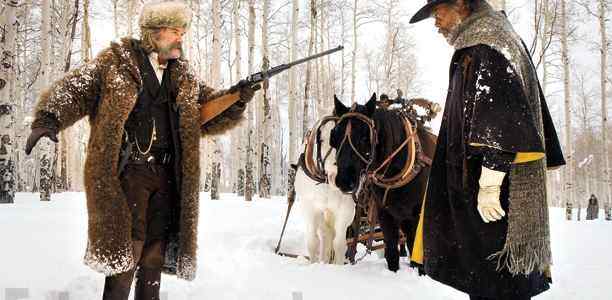
The western The Hateful Eight will not be released until Christmas time of this year, and fans are already clamoring to see it. Despite someone releasing the script online, the story has been kept very secret among Tarantino and the cast. What is known from the plot is that it takes place after the Civil War, where a couple of bounty hunters meet up in a cabin during a fierce blizzard. While it may be strange for Tarantino to make another western considering how each one of his films are from different genres, it could be a different kind of western than from Django Unchained. The title is very similar to the classic western The Magnificent Seven, which leads one to believe The Hateful Eight may be inspired from John Wayne styled westerns like The Searchers, and True Grit. Like every other cast in Quentin Tarantino’s filmography, the cast looks fantastic. Samuel L. Jackson, Kurt Russell, Tim Roth, Jennifer Jason Leith, Michael Madsen, and even rumors of Channing Tatum. Here’s hoping the film will be awesome… which it probably will be.
Tarantino’s Contribution to Cinema
Who would have guessed a kid that dropped out of high school would become one of the most essential directors of our generation. If there was a Mount Rushmore of movie directors, there would be a good chance Quentin Tarantino would be up there, along with the greats like Alfred Hitchcock and Stanley Kubrick. Yet what makes him so iconic besides giving his character unique speech patterns and stylized violence? What makes him more than just a fanboy for the vintage films he grew up with? There are plenty of reasons why film enthusiasts look up to him, but there are two big reasons why he is a beloved director, and both are plain as day when looking over his filmography.
The first reason is his use of diversity when casting black and female characters, who also get leading roles. To this day, film fans and critics beg Hollywood to have more diversity with gender and race, and they only get so many examples of diversity to quench their thirst. When watching Tarantino’s films, one cannot help but wonder why diversity is such a hard thing to come by in Hollywood, seeing how easily he does it. Kill Bill and Django Unchained will be remembered by audiences for demonstrating how diversity is not an earth-shattering concept in mainstream films.
The second reason is that by having a handful of films, it shows he prefers quality over quantity. A director should feel free to make as many movies as he/she wants, whether it be a small or large amount. Tarantino exclusively writes his own scripts to make sure that his characters and settings are envisioned just the way he wants. This is evident in how Tarantino has essentially created his own connected universe with all his films. It makes sense considering his films are in classic genres like crime thrillers and westerns, making it more unlikely that he will direct a sci-fi fantasy anytime soon. An example of his interconnected universe is how Vic Vega (Mr. Blonde) from Reservoir Dogs and Vincent Vega form Pulp Fiction are brothers, just in separate films.
Quentin Tarantino has implied that he could possible retire after The Hateful Eight, or possibly when he films his 10th movie. Even if he takes his retirement seriously, at least we can always look back on his work, and understand why the film world needs a Quentin Tarantino.
Work Cited
Tarantino, Q. (1992). Reservoir Dogs. United States: Miramax.
Tarantino, Q. (1994). Pulp Fiction . United States: Miramax.
Tarantino, Q. (1997). Jackie Brown . United States: Miramax.
Tarantino, Q. (2003). Kill Bill Volume 1 . United States, Japan: Miramax.
Tarantino, Q. (2004). Kill Bill Volume 2 . United States: Miramax.
Tarantino, Q. (2007). Death Proof . United States: Dimension Films.
Tarantino, Q. (2009). Inglourious Basterds . United States, Germany: Universal Pictures.
Tarantino, Q. (2012). Django Unchained . United States: Columbia Pictures, The Weinstein Company.
Tarantino, Q. (2012). The Hateful Eight . United States: The Weinstein Company.
Thomas, Leon. “Renegade Cut- Quentin Tarantino.” Channel Awesome. Channel Awesome, 2 May 2014.
Chitwood, Adam. “Quentin Tarantino Says DEATH PROOF Is the “Worst” Film He’s Ever Made; Watch Full Directors Roundtable Interview.” Collider. Collider, 28 Nov. 2012. Web. 14 Aug. 2015.
What do you think? Leave a comment.











On the upside he writes great dialog (something few do today), loves his characters and gives them all a chance to shine, and has given great parts to unlikely actors: Daryl Hannah, John Travolta, Bridget Fonda, Pam Grier, and others.
On the downside he does have a problem with violence: he thinks it’s funny.
Tarantino’s ability to bring old actors, and even actor starting out is certainly impressive. Without his films, names like John Travolta, Uma Thurman, Tim Roth, Christoph Waltz and even Samuel L. Jackson may not have been as well known as they are today.
I’m always interested to hear viewers thoughts on Tarantino’s violence. I personally have no problem with it, but I also understand at times it can be gratuitous. I’d much prefer to watch his masterful hand in Kill Bill 1&2 than any of the current slasher franchises. His use of blood is so, dare I say it, beautiful.
I really enjoy his movies. Like anyone’s some are better than others, but each one has had some kind of effect on me – even blooming Death Proof made me want to go and re-watch Vanishing Point, which, while about the only plus that movie has (although always nice to see Kurt get a run out), is a definite plus.
Pulp Fiction, Reservoir Dogs, Kill Bill(s), Django Unchained, True Romance and Jackie Brown would be a fantastic (if slightly visceral) way to spend a slow couple of days on an Easter Weekend.
That’s the thing with Tarantino. Even if you just think one of his films is just ok, there is always something memorable to take away from it.
He is a b movie maker, albeit one of par excellance .
That’s a perfect way of describing his films. He is a very talented b- movie filmmaker.
Actually, Tarantino would wear “b movie maker” as a badge of honor. Most, if not all, of his stuff is inspired by b movies. He just has more money, that’s all.
Tarantino is easily in the top 5 directors of the last 25 years IMO. Lars Von Trier, Paul Thomas Anderson and the Coen Brothers are the others that are in league with this guy. Wholehearted respect.
I whole-heartedly agree. He and other directors are filmmakers that are inspiring other filmmakers, even today.
How about Nolan?
Tarantino has certainly made a name for himself as a filmmaker. Whenever you hear about “that Tarantino film,” you know what to expect. I also think the soundtracks he uses for his films are great. The songs fit so well with what’s happening in the scene and set the tone.
It’s amazing how catchy his soundtracks in his films are. Whether he is sampling older music, or he’s getting fantastic composers to create amazing original tracks, his soundtracks are always great. My personal favorite is from Kill Bill
Terrible actor; extremely poor writer; an excellent director. Needs to work with other people’s material as he’s fast disappearing up his own backside.
While It would be cool for him to adapt a book to film, It takes a lot of talent to write your own scripts that is not an adaptation of a book, comic, video game… what ever. Plus, with so many successful Hollywood films being adaptations, it’s refreshing to see a director makes films that are completely his own.
I’d consider his writing his strongest attribute. He understands and lives in his own text and that transfers to the screen. I agree with Aaron that his films are refreshing, original, and completely his own.
I had the Reservoir Dogs poster on my wall as student and own pretty much every movie he has made on DVD.
Funny thing is just about his best movie was actually directed by the late, great Tony Scott – ‘True Romance’.
I did not mention True Romance because he did not direct it, which is a shame because it is a great film. It really does have a Tarantino styled dialogue through out the whole film. Tarantino and Tony Scott really do make a good team.
Late, yes. Great, no. Let’s not give a barely competent director more credit than he deserves. Will we be saying the same about Michael Bay once he departs?
Early films on a budget, great, tightly edited, punchy, funny and voilent great stuff
Later films with more free reign, 40mins too long and too self refferential see kill bill vol2 (minus the old master and graveyard scenes) and the last hour of Django.
Would like to see him do more with other peoples material i.e. Jackie Brown
Totally agree that he would be better off adapting a novel again. He needs to be weighted to the story instead of devolving into violent set pieces.
I just wish he’d evolve. He’s gone from a daring, interesting director to one who seems happiest making homages to himself. His movies are still more interesting than most of what’s out there, but they are getting less and less so.
(Also, he needs to take it easy with the N-word. It’s getting ridiculous.)
I would agree with you on him using the N-word a lot. While it makes sense in the context of Django Unchained, it is really unnecessary in his other films. That is one aspect of Tarantino’s films that I don’t like.
Jackie Brown is a MASTERPIECE.
It really is, it’s too bad the film gets overshadowed by his other films.
That’s a shame if Jackie Brown is overshadowed. It is well-written and thrilling, reminds me of Pulp Fiction.
Imagine if another, less known director had directed Jackie Brown? It would recognized far more. I love Robert De Niro in Jackie Brown. Some of his best work in my opinion.
Tarantino is an overrated, soulless, talentless hack. Everything he did (Buscemi, RZA soundtrack) Jim Jarmusch did first and way better. Tarantino killed American independent film.
Maybe “killed it” is an over reaction. It just seems as though before Tarantino, American Independent film was smart and daring and interesting. After Tarantino, we have a lot of people wanting to be just like Quentin Tarantino, and I really don’t think we need even one of him!
Yes, Jarmusch is influenced by French film and Japanese film, and literature and music and poetry, but he combines them with a real sense of their history and their importance. He ties them together with his own sense of soulfulness, with his own aesthetic. He doesn’t rely on cheap gimmicks and shocking but empty garishness.
I’m sorry, I find it hard to be sensible in discussing Tarantino, because he makes me really angry.
Killed it? I don’t think it’s dead. Also you could argue that plenty of Jim’s work was heavily borrowed from other influences and just given an American spin, he nods a hell of a lot to French cinema in particular.
When is he going to do a movie about the subjugation of the American Indian? Never.
You never know. He does like having diversity in his lead roles.
The epic long ass monologues and menial conversations are the true gems of Tarantino’s work.. How the minds of evil men work. The Sicilian bit from true romance, Jules and Vincent discussing divine intervention, and (my personal favorite) the anecdote in RD. Christoph Waltz in inglorious basterds was an amazing character also. Stoner Brad Pitt and the Pineapple Express connection.. And his four rooms bit with the roald Dahl connection.
All of his characters are memorable in some way, and each one of his films contains more just one iconic scene. May personal favorite scene in all of his films is The Bride and Bill having a tense conversation at the end of Kill Bill: Volume 2
ahh yeah! I forgot about his four rooms film. I’d like to see that again. Thanks for the reminder.
It was about the time Tarantino truly entered the mainstream consciousness with “Pulp Fiction” that the term “hipster” became largely meaningless.
Pulp Fiction was 1994. Long before I’d ever heard the term ‘Hipster’, is this because you were using it before it was cool?
I think Inglourious Basterds was his best movie with Christoph Waltz performance was easily the best dialogue in a movie ever.
When taking about Inglouriois Basterds, Brad Pitt’s quote sums it up the best: “I think this may be my masterpiece”
Great director, I don’t think he will really retire, he will try and then get a really great idea,and we all know how enthusiastic he gets.
I doubt that he will actually retire anytime soon because that guy is just too much of movie nerd to stop working as a director.
He makes films,great films,ok films,rubbish films, whatever their flaws they are never less than interesting, and he gets a lot of credit for trying to be creative and different in an industry that eats itself making sequels and trilogies.
I like Death Proof, the only problem was the script. Everyone bar Kurt Russell was just unbearable, in particular the women in the second half of the film. Everything else was fine. If he had just gotten someone else to write the script it would’ve been so much better. That’s his big problem I think. He can direct, but for all the hype he gets for his dialogue, he’s actually a terrible writer.
If they ever made a live-action Trigun or Cowboy Bebop movie, I could definitely see him directing one if not both of them. I mean, he’s already established himself as a master of western and crime films, so combining that with a dash of sci-fi would really expand his portfolio.
I would love if he did an adaptation of Trigun or Cowboy Bebob, but I highly count he would do that any times soon. He likes having his films being grounded in reality.
the man pops out pure Gold
too bad he looks like a retard..
QT is lazy. He is too lazy to tell a real story. His stories are 3/4 shock tactics 1/4 story.
Boring.
Except for True Romance.
I just love me some “Jackie Brown”.
A really beautiful picture.
QT has had the great achievement/misfortune of making an all-time great film in only his second try. I pity the fool who can’t appreciate the greatness of pulp fiction. It is a brilliant film, in every sense of the word, and very near flawless. We should be grateful for getting such a beautiful work of art, but it didn’t do QT any favors. How do you top that? His next film was pretty damn good – Jackie Brown – but it suffered in comparison, and after that he wandered off the reservation a little. Kill Bill and Grindhouse were ways to avoid those unfavorable comparisons to his masterpiece. A better way was his indirect effort with Rodriguez in Dusk til Dawn, which is also an excellent film.
Fortunately, QT is back on an upward trajectory, as Pulp is now receding in the rearview. Basterds was good, and Django was excellent; maybe QT can take another run at greatness with his next.
Pulp Fiction is smoke and mirrors. Nothing remarkable or fascinating about the story, it is just presented to us out of sequence, so we think it is deeper than it is. Snappy dialog, but pretentious as the day is long. No real soul or heart.
I have never seen a Quentin Tarantino film. My friends keeps insisting that I watch Pulp Fiction; she says it’s a masterpiece.
I would agree with your friend, as Pulp Fiction is the best introduction to Tarantino’s filmography. I hope you like it if you ever get the chance to watch it.
He’s become invested in full-on auteur theory–he’s a writer-director, damnit. He’s also become self-indulgent–occasionally working on projects where somebody will tap him on his shoulder and saying “a little more sincerity, a bit less winking, please”–would give his output greater balance.
I respect Tarantino and enjoy his work, but I’d like to see him vary his workload, and do some director-for-hire work on projects where he doesn’t have full rein to indulge himself. His ego would bridle against those constraints, but it would do him some good to be reined in on every third film or so, to force him to channel his talents (some of the time) toward themes and styles that are not so relentlessly hip and over-the-top.
Jackie Brown all the way through to Death Proof all feel like they were made because he had a handful of great ideas of scenes/casting/dialogue.
Both those films are some of his best, even a bit underrated in some respect
Apart from Pulp Fiction, Tarantino has offered nothing new to cinema for years,
He has given his characters some great monologues and wicked dialogue – he managed to make the banal seem cool (sometimes). The Coen brothers say, have always given their characters more humanity, warmth even, but QT’s, both good and bad, have always been memorable.
He’s been scandalously exploitative though too – the crash scene in Death Proof just for one (he presents strong sassy females characters then kills/dismembers them with multiple gory perspectives) – and the general bloodyness. I don’t think the whole ” Yeah but I was being true to the genre (or era)” plea ever entirely washed but that’s an ongoing argument..
Very true. Quentin Tarantino does have a ton of meliorable characters, most of them being villains.
Well I like some of his movies or some aspects of them, but the glorification of violence is objectionable on a lot of levels.
The objectionable violence is secondary to the psychology behind individuals with no cause for human life. Desperation and madness. As in poetry or Marquis de Sade one must sift through layers of imagery, reaction, irrelevance and symbolism to find the true meaning.
Hitler losing his face or graphic scalpings certainly require some level of desensitization though Lol
I think he is at his worst when he is too eager to include references and homage,but some of his work, like Basterds repay repeated viewing.
A great filmaker in my view. Inglorious one of my favorite surprises from the last few years.
It is a film that gets better each time you watch it.
What a great article on a great director!
The fact that he has said he would stop after his 10th film because he did not want to recycle his style and fall into repetitive film-making (when it starts going downhill) is really remarkable and should be respected. Tarantino is a true film passionate and is very aware of his own style and own impact. But he does the work for himself and knows his limits.
Very true. I don’t think he is as cocky as people make him out to be. He just has a high love for films, and that includes his own films. He talks about his films a lot because he’s proud of them, and he definably should be.
Man… the characters in Death Proof are lovely to me. Through the dialogs, he show how they enjoy each other and give them lovable personalities, even if those are somewhat simple. But that may be just me.
I thought the diagonal in Death Proof was fine, as there is no such thing as bad Tarantino dialogue. I just thought that the characters were unlikable, as they sort of lacked any empathetic values. I still love the film regardless. Thanks for commenting 🙂
Tarantino’s work oozes passion for the business, which is probably why his films are so undeniably entertaining to absorb.
That’s a perfect way to describe Tarantino’s work.
Oozes passion… and love for bloody violence :).
Tarantino feels like a highly stylized type of director. His use of violence can at times be uncomfortable but I find it as just a way Tarantino gets his message across. I think his movies have evolved into movies with a greater moral meaning that are supposed to keep you on your toes
Very true. Once you get past his bloody violence, he is incorporates a lot of moral complexity than people give him credit for.
Even with a film I wasn’t a fan of, Inglorious Basterds had so many scenes I remember vividly, such as the opening scene or the bar scene. His movies are so distinct and memorable, he is definitely one of the loudest (and original) voices in cinema today, there’s no denying that. Great article!
Thank you michael. I’m glad you enjoyed Tarantino’s work
It speaks to the adroitness of the director and the actors reoccurring in the director’s films when they are able to play roles – when compared, juxtaposed, whichever – that are able to be distinct from one another such that the actors aren’t “type-casted.” It’s incredible to see. It’s why it’s so easy to pick out a Tarantino movie once it’s described.
An entire article about Tarantino and no mention of Roger Avary. Shame Shame.
As his films have progressed, his use of blood and gore have become more ridiculous. Reservoir Dogs and Jackie Brown involved gore when it served the story, whereas Kill Bill and Django Unchained made a spectacle of blood geysers. I remember Tarantino explaining his use of gore by quoting Jean-Luc Godard: “It’s not blood, it’s red.”
I wouldn’t call myself a Tarantino fangirl by a long shot, but I do love his movies. I love the way he crafts his characters. Hans Landa is one of my favorite villains because he’s so well-developed and terrifying. Like you said in your article, he really thinks he’s doing what’s right. He’s also a survivalist, and does what he has to in order to get by (like in the negotiation scene at the end).
The blood, guts, and gore doesn’t really bother me, although I can agree it’s used in excess as he produces more films.
I like Tarantino as much as the next guy but this article seems very biased in his favor. Tarantino is a great director but there’s a lot to criticize even his best films for. Also, the Reservoir Dogs and Pulp Fiction segments didn’t really provide any new or exciting insights. Both films have a lot to talk about within them and I’m a little disappointed you didn’t spend more time on them. Your Kill Bill and Inglorious Basterds sections were a lot more detailed and I would have loved to seen that attention spent on the other films too.
His films are brilliant, and they righteously frustrate me in the sense that I can’t analyze them as much as I’d like to. He’s even said himself that his use of violence is purely an aesthetic thing, nothing political. I think he’s one of the only directors that I can name (at this very moment) that I appreciate solely for entertainment and aesthetic purposes. Films by David Fincher, Scorsese, Miyazaki, and others let me look deeper into what the film provides. With Tarantino I can just sit back and, dare I say it, enjoy myself without thinking too deeply.
Very true. I talked in my article why his films are brilliant on an analytical level, but when you get right down to it, his films are just fun. Simple as that.
I personally could do with less violence from Tarantino (too much is unnecessary), but I do see the logic behind inserting it (violence is to Tarantino as Special Effects is to Michael Bay: both make the film more eye-catching and thus, grab more people’s attention).
I do agree with a point you made earlier in the article. You said that Tarantino is criticized for stealing material from other films and filmmakers. I agree with this statement, because Tarantino doesn’t necessarily steal material from other directors, but sort of pays homage to these guys by adding similar shots these filmmakers have used in their films.
George Lucas got the idea of “jedi” from the Japanese term,” jidaigeki.” This old, Japanese term was given to plays and films about Japanese samurais. So, the jedis in Star Wars are clearly being referenced to samurais in old Japanese movies.
Even if you don’t like his films, you are right that he is very memorable in his craft. His thing with putting himself in his own films is interesting, and I would like it a lot more of he weren’t just so terrible at acting, haha.
Is it unpopular to like JB more than PF? I think it’s his most human film. One can really connect with the characters and see all the sadness/pain inside of them. It’s his masterpiece.
Genius writer and director! Him and Woody Allen, albeit very different, are two writer-directors who can consistently produce with constant style and wit. They are so passionate and in love with what they do.
I love that with Tarantino nothing is surface level. There is always a reason and a purpose for what he does, even with the blood geysers (I don’t care what people say I think they’re cool). If I had one wish I would want to work under Tarantino because I believe I could learn so much.
Great article! However, it is worth noting that there was in fact a flashback-like device in Jackie Brown. The bag switching scene in the clothing store was shown three different times from the points of view of Jackie herself, followed Louis and Melanie together, and finally Max Cherry. While not a typical flashback in practice or narrative function by any means, the fact remains that the internal time of the story was rewound for the sequence. Anyway, building off of what you said about QT’s contributions to the cinematic world, he is among the most feverish supporters of using good ol’ fashioned film stock as opposed to digital. He’s also vehemently against streaming services such as Netflix.
It is not un common to find yourself watching an explicitly graphic, but brilliant based story line, featuring world renown actors after watching a Tarantino film. It is his precise way of directing his 5 star rating movies. It’s what makes his type of directing vastly unique and in some ways, even bizarre.
Tarantino is a legend! He is a brilliant director with so much talent. It’s crazy to think that people have accused him for being unoriginal. His work will go down in history. I find it funny that Reservoir Dogs had such a low budget that the cast had to wear their own wardrobe and now it’s seen as an iconic film. Tarantino will be one of my favourite directors forever!
Aaron,
You mention Four Rooms. Did you make it through the first three vignettes to get to Tarantino’s? I though the film in general was a major misfire, even Tarantino’s section seemed a bit phoned in to me.
I actually really liked Tarantino’s segment at the end of Four Rooms, and it was probably my favorite part of the film. I just didn’t discuss it in the article because I mainly wanted to focus on his full length films.
In my creative writing class this morning we were discussing vignettes and Tarantino came up as an example. Although I haven’t watched Four Rooms yet myself, my tutor was going on about it with such enthusiasm that I’ll have to watch it! (I know this was written in 2015 but I thought I’d just chime in haha)
This was a fantastic read, you touch on the unique aspects of the films in an articulate style. Well done! I love Tarantino’s unique directing style and artistic vision. Such an inspiration.
This article is brilliant. I am biased- I love Tarantino. I feel that you truly understand his work and I love all the great points you made on every film. Although it is interesting to read in a comment above that someone believes Tarantino thinks “violence is funny.” I think Tarantino acknowledges that violence exists, and so that it is not the entire essence of his films, he frames the violence with witty dialogue as you noted. I feel that Tarantino is intelligent in his decisions, with every film, and that even though violence is prominent in his films, it is the thread of humanity throughout that makes his work so great, and impossible to put into a box what his movies are; dramas, comedies, action films- he does it all with each one!
Thank you rosiebennet. Tarantino certainly is in a league of his own, and he is defiantly my favorite director working today.
I specifically choose to read this article because I love Tarantino! He’s sets standards for being true to himself and his art! Regardless of what critics say, he is definitely one of the best of all time. My favorite movie is Pulp Fiction, I love the long drawn out monologues, especially from Samuel L. Jackson.
That’s awesome, Folasade. My favorite film by him would have to be Kill Bill Volume 1 & 2
The divine intervention motif in Pulp Fiction also includes how Jules and Vincent miraculously survive being gunned down at point blank range. It’s interesting how Jules interprets this as divine intervention, whereas Vincent treats it as chance. Jules has a kind of religious conversion, vowing to stop being a hit man and change his life. In the diner scene, Jules acts as a mediator instead of simply killing the misguided robbers. Vincent chooses to remain a hit man and ends up getting killed by Butch. This is part of the beauty of the non-chronological structure of the film: at the end of the movie, when Jules and Vincent leave the diner, we already know that Vincent is going to his death.
Great article on one of my favorite directors! Quentin Tarentino’s Pulp Fiction is the film that showed me what movies could be. An interesting thought though: Is it possible that Tarentino’s ultraviolence is him trying to bring out a metanarrative in his films? That, maybe, he’s bringing attention to the fact that what he is making is obviously unrealistic and we should just enjoy the excess and the exageratted portions of this film (like in QT changing or history or the inflated racism of Mr. Candy) there is always a trend to make films as realistic as possible to in order to convery truth or an agenda. I think he’s trying to resist that realist aspect of filmmaking. Tarentino lets his creativity go wild and while his films can be unrealistic, they can better capture some aspects of truth that realism in film can’t.
One does not get simply over Pulp Fiction. 🙂
The violent thread is there to pull, but “Four Rooms” is missing from your analysis. If you haven’t seen it, it’s refreshing compared to the drama we are use to seeing in QT’s movies. But the violence is still there, great article.
I have seen Four Rooms, and I did like the story that Tarantino directed. The reason I left Four Rooms off the list is because I mainly wanted to focus on his full-length films.
Tarantino is one of my favorites because Pulp Fiction and Kill Bill are two of my favorite films possibly ever at this point. I think there’s only one film of Tarantino’s that I don’t like
Pulp Fiction and Kill Bill are probably my two favorite Tarantino films as well.
He’s incredibly stylized and has a knack for etching pastiches of genres together in a way that usually feels fairly original. I think that he can fall into the trap of over-glorifying violence when perhaps he doesn’t need to, but I can’t really hate what he does too much considering the argument would be he’s doing it to make a point.
I don’t necessarily think that he deserves the accolades that the great film-makers get, but I do think he is undoubtedly important in the context of post-90s film-making. I’m still uncertain how he’ll be viewed in 20-30 years, but currently he’s at least a film-maker that you expect to make something completely different to anyone else working. That might also be the reason he remains something of an outcast – in the good sense I’d hasten to add.
I just came across this article today, and after having watched Hateful Eight only yesterday I’m still caught up in the most controversial aspect of most of his films; the violence. And I realized that his use of violence is so fascinating because of the way he is able to manipulate it. For example, in Django much of the violence was silly and used mainly for aesthetic value. But then you have scenes like the one where they feed the slave to the dogs or the mandingo fight and the tone of the film completely changes all in that one instant. That he’s able to manipulate violence to suit his purpose so well is amazing.
Inspiration to finally watch Jackie Brown.
Quentin Tarantino is undoubtedly one of the best directors in terms of creativity. His stories are not only to be ironic and controversial but also to ridiculously show senses of black humor.
Among all the Tarantino’s movies, I like Pulp Fiction the most. I find out his storytelling skill is really impressive in this cult film.
1. Pulp Fiction.
2. Reservoir Dogs.
3. Django Unchained.
Never watched Jackie Brown to the end. Loved Christoph Waltz’s scenes in IB and the bar scene but the rest doesn’t do as much for me. Tarantino is an iconic film-maker, but that can be a double-edged sword. It means that he is capable of amazing work, but it also means there is no-one to rein him in when he’s being self-indulgent (IB and DU could both have been a half-hour shorter, and both would be better for it).
Overall, a good article and a fantastic, if sometimes flawed, creator.
You have a good point. Scenes in films like IB and Django and even Pulp Fiction can be every long. While I for the most part find it admirable from a storytelling standpoint, I can see why some audience can see it as unnecessarily long.
As an auteur-styled filmmaker, Tarantino represents an intriguing case study. His work is very refreshing, yet also unique due to his mainstream success. The fact that he writes and directs his films is also a rare feat in 21st century popular cinema, especially as they are fairly incomparable to those of any other filmmaker contemporarily. Nonetheless, Tarantino accomplishes his style and narrative forms through constantly referencing and paying homage to other films: namely, the spaghetti westerns of Leone, kung fu films, Fellini, and other B movie / exploitation pieces. Accordingly, the “originality” of his films comes into question. In this regard, Tarantino views himself as a successor of Godard’s similar technique of in film “quoting.” And while your average movie-goer heading to the theatre to see the newest Tarantino work of action and violence may not catch the slightest reference to some fifty year old film, the informed film viewer can note the extent to which Tarantino’s oeuvre is indebted to and aware of cinematic tradition and history.
Something else Tarantino does in his films, is repetitive use of actors; Sam L. Jackson, Kurt Russel, Uma Thurman and Tim Roth. I think this tricks the mind in thinking that seeing these actors in an older classic film will make the newer film just as good, or better, which is solely based on your opinion, or interpretation of the movie. Tarantino also does a really good job of casting known actors in great roles; Brad Pitt (Inglorious Basterds), Jamie Foxx (Django Unchained) and John Travolta (Pulp Fiction). This was a great article to read if you’re a Tarantino fan.
Extremely good director, Django Unchained was probably one of the most terrifying films I’ve ever watched but what else can you expect from films with so much symbolism. It’s all quality on tracing dogma throughout history.
What draws me to Tarantino’s films is the passion for film and film history that just seeps through his work. Where people may believe he is “unoriginal” by using a variety of genres and styles, is really just paying homage to it in the music, dialogue, characterization and storytelling that make it so compelling. All films “take” from other films (Maybe with the exception of Hitchcock, honestly), but it is what they do with it to evoke conversation to new audiences that is the difference. I watched Kill Bill at 12 and was completely mesmerized at what storytelling and action could do in one film.
Wonderful read. Tarantino is arguably one of the greatest directors in cinematic history. Really enjoyed the part where you defend his borrowing of cult films, of course a director will borrow something they love from someone!
I am someone who tends to defend Tarantino’s ostentatious use of violence as a plot device. Sometimes I feel that I am giving him too much credit, like Robert’s head being shot off in The Hateful Eight as a commentary on racism in America. It could have just been fun filling a dummy with goop. Gore and blood seem like fun things to play with on set, but it’s true that they cause an audience to react strongly (for better or for worse). I ultimately think the take away from his violence is that there is something embedded in humanity that craves this kind of entertainment, which is frightening, but also thought-provoking. Great article (wish it had been more closely edited).
Tarantino is the world’s biggest film buff who also makes films. The effort and passion he puts into his work is so clear in all his films to be maximal, and his style is instantly recognisable; I love ‘Tarantino dialouge,’ and the way he builds tension in seemingly simplistic ways makes for, in my opinion, some of the most entertaining movies ever made.
To sum up Tarantino in a single sentence “minimal in making, irresistible to imitate”
A bit too easy to fall in love with his work. A genius indeed.
I disagree with the title of this post and I’m well aware that my opinion will probably be unpopular – the title should read – The Work of Quentin Tarantino: Quantity Over Quality.
He only ever made one good movie, Jackie Brown, and of the rest I’d say Reservoir Dogs was OK at best. His remaining titles are overblown and selfindulgent homages to exploitation classics he’s not even worthy of commenting on. His movies quite literally reek of style over substance. That said, if he employed himself a good editor (ha – like his ego would ever allow an editor to mess with his ordained vision) he would be producing much better work. Pulp Fiction, for example, could have been a really good movie if it was just edited down by a good third – mainly missing out much of the pointless, rambling silioques and speaches the like of which no one ever makes in real life.
I get that, to the mainstream his work is edgy and extreme, and may seem new and different – but to anyone, like myself, who has an interest in exploitation cinema past and present, his work is derivative and a pale imitation. The Kill Bill films, as another example, can never hope to match the great Hong Kong Martial-Arts movies that he so plainly wishes to ape. And don’t even get me started on Django Unchained – the Spaghetti Western that wasn’t.
This was really good. However, I was looking for a little more focus on Tarantino’s frame work.
Tarantino’s work is special due to the lack of films he has created, rather than churning out films by the hour he takes his time to write scripts and meticulously craft original stories. Therefore each feature film is an event because fans and filmgoers alike expect the years taken to create the film to produce something special.
the first Quentin Tarantino film I ever saw was pulp fiction, and I just remember how amazed I was by all of it. The characters, dialogue, camera shots, story telling and how each event unfolded. This movie really changed my perspective on film and how movies can be made. I’ve only ever seen Pulp Fiction, so I would like to watch his other films! but I’m glad I read this article. I will now have a deeper perspective and appreciation for his films, or at least have more content to go off by when I find myself analyzing another great director’s films.